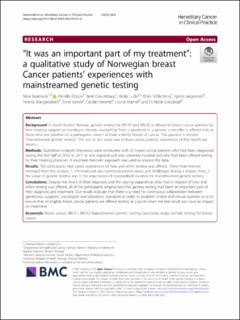| dc.contributor.author | Strømsvik, Nina | |
| dc.contributor.author | Olsson, Pernilla Marie A. | |
| dc.contributor.author | Gravdehaug, Berit | |
| dc.contributor.author | Lurås, Hilde | |
| dc.contributor.author | Schlichting, Ellen | |
| dc.contributor.author | Jørgensen, Kjersti | |
| dc.contributor.author | Wangensteen, Teresia | |
| dc.contributor.author | Vamre, Tone | |
| dc.contributor.author | Heramb, Cecilie | |
| dc.contributor.author | Mæhle, Lovise Olaug | |
| dc.contributor.author | Grindedal, Eli Marie | |
| dc.date.accessioned | 2022-10-03T11:19:14Z | |
| dc.date.available | 2022-10-03T11:19:14Z | |
| dc.date.created | 2022-04-27T14:02:01Z | |
| dc.date.issued | 2022 | |
| dc.identifier.citation | Strømsvik, N., Olsson, P., Gravdehaug, B., Lurås, H., Schlichting, E., Jørgensen, K., Wangensteen, T., Vamre, T., Heramb, C., Mæhle, L., & Grindedal, E. M. (2022). “It was an important part of my treatment”: a qualitative study of Norwegian breast Cancer patients’ experiences with mainstreamed genetic testing. Hereditary Cancer in Clinical Practice, 20(1):6. | en_US |
| dc.identifier.issn | 1731-2302 | |
| dc.identifier.uri | https://hdl.handle.net/11250/3023333 | |
| dc.description.abstract | Background
In South-Eastern Norway, genetic testing for BRCA1 and BRCA2 is offered to breast cancer patients by their treating surgeon or oncologist. Genetic counselling from a geneticist or a genetic counsellor is offered only to those who test positive for a pathogenic variant or have a family history of cancer. This practice is termed “mainstreamed genetic testing”. The aim of this study was to learn about patients’ experience of this healthcare service.
Methods
Qualitative in-depth interviews were conducted with 22 breast cancer patients who had been diagnosed during the first half of 2016 or 2017 at one regional and one university hospital and who had been offered testing by their treating physician. A six-phase thematic approach was used to analyse the data.
Results
The participants had varied experiences of how and when testing was offered. Three main themes emerged from the analysis: 1. informational and communicational needs and challenges during a chaotic time, 2. the value of genetic testing and 3. the importance of standardised routines for mainstreamed genetic testing.
Conclusions
Despite the shock of their diagnosis and the varying experiences they had in respect of how and when testing was offered, all of the participants emphasised that genetic testing had been an important part of their diagnosis and treatment. Our results indicate that there is a need for continuous collaboration between geneticists, surgeons, oncologists and laboratory specialists in order to establish simple and robust routines so as to ensure that all eligible breast cancer patients are offered testing at a point when the test result can have an impact on treatment. | en_US |
| dc.language.iso | eng | en_US |
| dc.publisher | BMC | en_US |
| dc.rights | Navngivelse 4.0 Internasjonal | * |
| dc.rights.uri | http://creativecommons.org/licenses/by/4.0/deed.no | * |
| dc.title | “It was an important part of my treatment”: a qualitative study of Norwegian breast Cancer patients’ experiences with mainstreamed genetic testing | en_US |
| dc.type | Peer reviewed | en_US |
| dc.type | Journal article | en_US |
| dc.description.version | publishedVersion | en_US |
| dc.rights.holder | © The Author(s). 2022 | en_US |
| dc.source.volume | 20 | en_US |
| dc.source.journal | Hereditary Cancer in Clinical Practice | en_US |
| dc.source.issue | 1 | en_US |
| dc.identifier.doi | 10.1186/s13053-022-00212-6 | |
| dc.identifier.cristin | 2019562 | |
| dc.source.articlenumber | 6 | en_US |
| cristin.ispublished | true | |
| cristin.fulltext | original | |
| cristin.qualitycode | 1 | |

